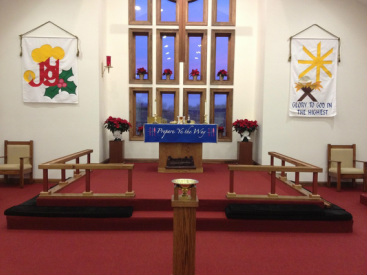Worship
Divine Service

Saturday Evening, 5:00 PM
Sunday School, 9:15 AM -- Sunday Morning, 10:30 AM
Call (615) 791-1880 for information
The term "Divine Service" is somewhat unique to Lutheranism, and it reflects the theology of justification held by Lutherans. The term comes from the German word Gottesdienst (God service), and is significant because it reflects the Lutheran belief that the main actor in the Divine Service is God himself and not man. The connotation of the term is that the Word and Sacrament (the two parts of the Divine Service) are gifts that God gives to his people, and therefore Lutherans emphasize God's work rather than that of man. The term Mass was used by early Lutherans [1] but such use has dwindled since then. Also, Lutherans have historically used the term to distinguish the Divine Service with Protestant Worship, where often the focus is on the worshiper bringing praise and thanksgiving to God.
We celebrate this, His Service to us through a liturgy of three basic parts:
Confession and Absolution:
In the confession and absolution, we celebrate the forgiveness which was won for us through His sacrifice. We first make a concerted effort to recognize our unworthy, sinful state and attempt to recall the sins which we have committed. We recognize that we have gone against His will for us, sinning not only on purpose but also because of our selfish human nature. We promise, with all of the sincerity and purpose that we can manage, to turn away from our sins and to try to align our will with his. We ask for His help to succeed in this and for His forgiveness when we fail to do so. The pastor then assures us of, and pronounces our forgiveness, purchased for us through Christ and His final atoning sacrifice on the Cross.
The Service of the Word:
We celebrate the gift of His divine communication to us through the words of the Holy Scripture. We believe that the Bible is the inspired word of God and is both complete, and completely truthful in describing Gods relationship with us, His children. We read His word, and apply His word to our lives as He so commands.
The Service of the Sacrament:
We celebrate with particular reverence the sacrament of Holy Communion, where He made His particular covenant with us, to be with us always. As a sacrament, we believe that He personally instituted this ritual to allow all of us to directly obtain His grace by consuming His true Body and Blood. We make no attempt to explain when or how the bread and wine are His Body and Blood: It is because He say "this is".
Sunday School, 9:15 AM -- Sunday Morning, 10:30 AM
Call (615) 791-1880 for information
The term "Divine Service" is somewhat unique to Lutheranism, and it reflects the theology of justification held by Lutherans. The term comes from the German word Gottesdienst (God service), and is significant because it reflects the Lutheran belief that the main actor in the Divine Service is God himself and not man. The connotation of the term is that the Word and Sacrament (the two parts of the Divine Service) are gifts that God gives to his people, and therefore Lutherans emphasize God's work rather than that of man. The term Mass was used by early Lutherans [1] but such use has dwindled since then. Also, Lutherans have historically used the term to distinguish the Divine Service with Protestant Worship, where often the focus is on the worshiper bringing praise and thanksgiving to God.
We celebrate this, His Service to us through a liturgy of three basic parts:
Confession and Absolution:
In the confession and absolution, we celebrate the forgiveness which was won for us through His sacrifice. We first make a concerted effort to recognize our unworthy, sinful state and attempt to recall the sins which we have committed. We recognize that we have gone against His will for us, sinning not only on purpose but also because of our selfish human nature. We promise, with all of the sincerity and purpose that we can manage, to turn away from our sins and to try to align our will with his. We ask for His help to succeed in this and for His forgiveness when we fail to do so. The pastor then assures us of, and pronounces our forgiveness, purchased for us through Christ and His final atoning sacrifice on the Cross.
The Service of the Word:
We celebrate the gift of His divine communication to us through the words of the Holy Scripture. We believe that the Bible is the inspired word of God and is both complete, and completely truthful in describing Gods relationship with us, His children. We read His word, and apply His word to our lives as He so commands.
The Service of the Sacrament:
We celebrate with particular reverence the sacrament of Holy Communion, where He made His particular covenant with us, to be with us always. As a sacrament, we believe that He personally instituted this ritual to allow all of us to directly obtain His grace by consuming His true Body and Blood. We make no attempt to explain when or how the bread and wine are His Body and Blood: It is because He say "this is".
